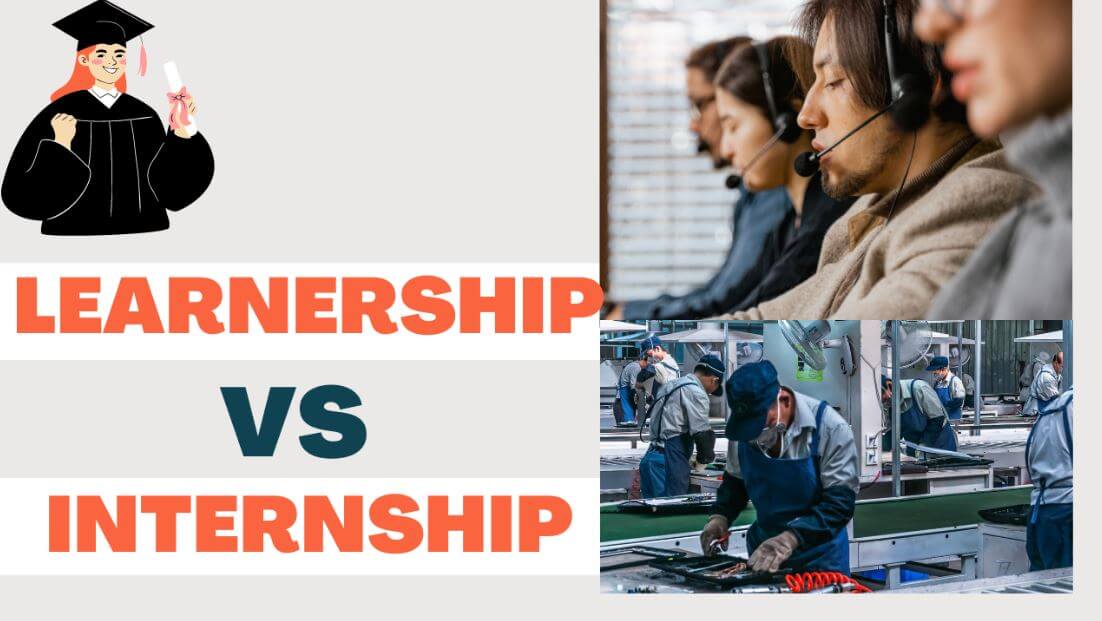
Learnerships vs Internships in South Africa
Learnerships vs Internships in South Africa, When you’re just starting your career in South Africa, two common opportunities you’ll come across are learnerships and internships. While both offer valuable work experience, they’re not the same — and choosing the right one can make a big difference in your career path.
In this guide, we’ll break down the key differences between learnerships and internships in South Africa, their benefits, challenges, and which one might be the best fit for you.
What Is a Learnership?
A learnership is a structured learning programme that combines theoretical education with practical workplace training. In South Africa, learnerships are governed by the Skills Development Act and overseen by various Sector Education and Training Authorities (SETAs).
Key Features of Learnerships:
- Leads to an NQF-registered qualification
- Typically lasts between 12 to 24 months
- Includes both classroom-based learning and on-the-job training
- Funded by SETAs, and learners often receive a stipend
- Ends with a nationally recognised qualification
Example:
A person completing a Business Administration NQF Level 4 Learnership would attend theoretical classes and work in a real business environment to apply those skills.
What Is an Internship?
An internship is a temporary work placement that provides practical work experience in a specific industry. Unlike learnerships, internships are not necessarily linked to formal qualifications.
Key Features of Internships:
- Provides workplace experience
- Usually lasts between 3 to 12 months
- May or may not be paid (some offer a stipend, others are unpaid)
- Often aimed at graduates or final-year students
- No qualification at the end, but valuable for CV building
Example:
A university graduate in marketing might take on a 6-month internship at a digital agency to gain experience in social media management and content creation.
Learnerships vs Internships in South Africa: A Side-by-Side Comparison
| Feature | Learnership | Internship |
|---|---|---|
| Qualification | Yes – NQF registered | No formal qualification |
| Duration | 12–24 months | 3–12 months |
| Eligibility | Youth, unemployed individuals, matriculants | Mostly graduates or final-year students |
| Stipend | Yes, mandatory | Not always guaranteed |
| Legislation | Governed by Skills Development Act | Not formally legislated |
| Workplace Exposure | Integrated with classroom learning | Practical work experience only |
| Goal | Gain skills and a qualification | Gain experience and industry exposure |
Benefits of Learnerships
- ✅ Earn while you learn
- ✅ Nationally recognised qualification
- ✅ Opens doors for permanent employment
- ✅ Improves skills development in priority sectors
- ✅ Supports transformation and B-BBEE targets
Downsides:
- ❌ Lower stipends compared to full-time jobs
- ❌ Competitive entry requirements
- ❌ Limited to specific qualification levels
Benefits of Internships
- ✅ Direct exposure to your chosen industry
- ✅ Helps you build a professional network
- ✅ Boosts your CV
- ✅ May lead to permanent employment
Downsides:
- ❌ No qualification earned
- ❌ Not always paid
- ❌ Can be short-term and unstable
Which One Should You Choose?
Your choice depends on your goals, current qualifications, and where you are in your career journey.
Choose a Learnership if:
- You don’t yet have a post-school qualification
- You want to earn a formal qualification
- You’re interested in structured learning and mentorship
Choose an Internship if:
- You’ve already completed a diploma or degree
- You want to gain experience in a specific company or industry
- You’re trying to get your foot in the door of a competitive field
Real-Life Example
Thabo, a matriculant from Gauteng, applied for a Retail Operations Learnership through W&RSETA. He earned a stipend, completed workplace training in a large supermarket chain, and received an NQF Level 3 certificate.
Nomsa, a marketing graduate from UJ, applied for a 6-month marketing internship at a Johannesburg tech start-up. Although unpaid, the experience led to a full-time job as a digital marketing assistant.
Current Learnership and Internship Opportunities
Here are some updated links where you can explore available learnerships and internships in South Africa:
Learnership Listings:
- SA-SETA Learnerships 2025
- Skills Portal – Learnerships
- Careers Portal – Learnerships
Internship Listings:
- DPSA Internships
- Graduates24 Internships
- Indeed South Africa – Internships
Final Thoughts: Learnerships vs Internships in South Africa
Both learnerships and internships can kickstart your career, but they serve different purposes. Learnerships offer a pathway to formal education and skills development, while internships provide valuable hands-on experience that can help you transition from studying to working.
By understanding the difference between learnerships vs internships in South Africa, you can choose the path that aligns best with your career goals.
Frequently Asked Questions
1. Can I do both a learnership and an internship?
Yes, many South Africans start with a learnership and later pursue an internship to gain additional experience in a specific field.
2. Is a learnership better than an internship?
It depends on your goals. A learnership is ideal for those without formal qualifications, while internships benefit graduates seeking industry experience.
3. Do internships count as work experience?
Absolutely. Many employers value internship experience, especially in competitive fields like IT, finance, and media.
4. Are learnerships only for young people?
While learnerships target youth (18–35), some programmes are open to older individuals or those looking to re-skill.
Ready to Apply?
👉 Check out the latest Learnerships & Internships Hiring Now
